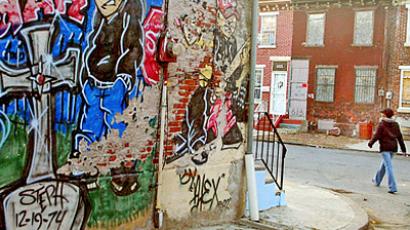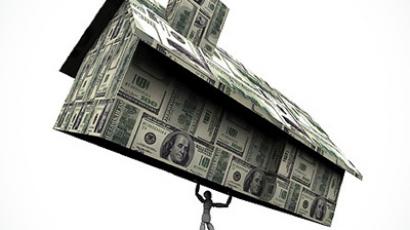Banks bulldozing towns across America

If something is giving you a hard time, there is one surefire American way to solve your problems: knock it straight to the ground.
That’s the plan that Bank of America and a number of other financial institutions have been initiating lately. And the victims? Hundreds of foreclosed homes from coast-to-coast.With more and more homes being foreclosed, real estate specialists are showing worry that never-ending housing transactions could greatly diminish prices. It’s the logic behind the rules of supply and demand and it has bankers running scared. That’s why BofA and others are solving this problem by taking a wrecking ball to the wretched abodes."There is way too much supply," Gus Frangos, president of Cuyahoga County Land Re-utilization Corp. of Cleveland tells Bloomberg. “The best thing we can do to stabilize the market is to get the garbage off."Bank of America announced In July that they plan on bulldozing 100 homes in the Cleveland, Ohio area alone, TIME reports. What’s left of the land will then be donated to the local government. TIME adds that the Bank has already given around 100 homes in Detroit and 150 in Chicago back to local authorities. Those Detroit demolitions costs BofA around $1 million just in bulldozing, but the end-result could bring in some serious dough for the banks and ideally the community.Bulldozing not just takes down unsightly eye sores but can also make room for new developments that’ll drive up property prices. In some cases, thousands of dollars can even go to the effort thanks to the federal Neighborhood Stabilization Program. And by eliminating upkeep costs and diminishing prices on vacant, foreclosed homes, banks stand to receive tax breaks and deductions by donating them to cities."No one needs these homes, no one is going to buy them," Christopher Thornberg, founding partner at the Los Angeles office of Beacon Economics LLC, a forecasting firm, adds to Bloomberg. "Bank of America is not going to be able to cover its losses, so it might as well give them away and get a little write-off and some nice public relations."Currently America is home to nearly 1.7 million homes in foreclosure; that’s around one out of every 77 in the month of June and 3.5 million saw foreclosure between 2008 and 2010. Bank of America itself saw 40,000 in just the first quarter of 2011. Wells Fargo, JPMorgan, Citigroup and Fannie Mae are all following in their footsteps with plans to knock down houses.Last year, Detroit Mayor Dave Bing proposed a massive downscale for the Motor City. Mr. Bing suggested the bulldozing of around one-quarter of the entire city’s houses and empty buildings over three years times to make way for new structures. At that time, James W. Hughes, dean of the School of Planning and Public Policy at Rutgers University, told The Associated Press, “Things that were unthinkable are now becoming thinkable.”"There is now a realization that past glories are never going to be recaptured. Some people probably don't accept that, but that is the reality,” said Hughes.














